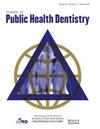Social support and oral health among working-age and older adults in the United States
Abstract
Objectives
The purpose of this study was to examine the association of social support with untreated dental caries and severe tooth loss in adults in the United States.
Methods
This cross-sectional study was conducted by analyzing data obtained from 5,447 individuals, 40 years of age and older, in the National Health and Nutrition Examination Survey (NHANES) from 2005 to 2008 who had both a complete dental examination and social support index measures. Sample characteristics, overall and by social support level, were examined through descriptive statistical analyses. Logistic regression analyses were performed to estimate the association of social support with untreated dental caries and severe tooth loss.
Results
In this nationally representative sample (mean age 56.5 years) the prevalence of low social support was 27.5%. The prevalence of individuals with moderate-to-high social support increased with higher levels of educational attainment and income level. In fully adjusted models, relative to those who had moderate-high social support levels, individuals with low social support had 1.49 higher odds of untreated dental caries (95% CI, 1.17-1.90, p=0.002) and 1.23 higher odds of severe tooth loss (95% CI, 1.05-1.44, p=0.011).
Conclusions
Higher odds of untreated dental caries and severe tooth loss were found among U.S. adults with low levels of social support compared to those with moderate-to-high levels of social support. Additional studies are warranted to provide a more current perspective on the impact of social support on oral health so that programs may be developed and tailored to reach these populations.

 求助内容:
求助内容: 应助结果提醒方式:
应助结果提醒方式:


